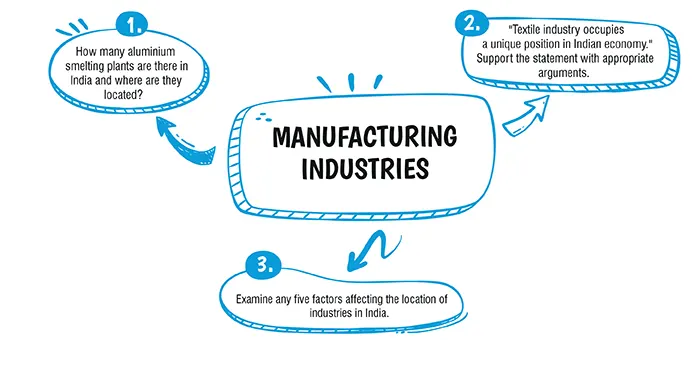Home / Boards / CBSE / Important Questions / Class 10 / Social Science / Manufacturing Industries
Table of Contents

Ans. (c)
Explanation:
Common pollutants produced by engines that burn fossil fuels are carbon dioxide, nitrogen oxides, sulphur dioxide, volatile organic compounds (VOCs), and particulates. Stoves, incinerators, and open burning produce carbon monoxide and carbon dioxide, as well as particulates.
Ans. (a)
Explanation:
The manufacturing sector is considered the backbone of development of a country.
Explanation:
There are 8 aluminium smelting plants in India, located in Odisha, West Bengal, Kerala, Uttar Pradesh, Chhattisgarh, Maharashtra and Tamil Nadu.
Explanation:
The textile industry occupies a unique position in Indian economy because :
(i) It contributes significantly to industrial production and it also provides employment.
(ii) Earns foreign exchange of 24.6%.
(iii) Its contribution towards the GDP is about 4%.
Explanation:
Factors affecting the location of industries in India are :
1. Raw Material : The easy availability of raw materials is an important factor that affects the bay (now Mumbai) had supply of cotton coming from Gujarat and Vidarbha and the jute mills of Hooghly region got the raw material from the delta region of the Ganga. The nature of raw material also has a bearing on the location.
2. Energy : Energy is another important factor that affects the location of an industry. For example, the iron and steel industry has been traditionally tied with the coal resources, as it uses coal as cooking fuel. Similarly, the electro-metallurgical and electro-chemical industries, being power intensive, have been located where electricity is easily available.
3. Transport : A cheap and effective transport system is another factor that determines the location of an industry. Transport is required for carrying raw materials to manufacturing units and finished products to the market. The earliest industries developed near the port towns of Kolkata, Mumbai and Chennai, as these ports were linked with rail and road to the hinterland. This infrastructure for transport was further developed after Independence.
4. Labour : Easy availability of cheap labour is another factor for the determination of the location of an industry. Unskilled labour is easily available in urban locations due to large rural-urban migration. One characteristic feature of labour as a factor of production is its mobility. The industrial belt around Mumbai attracts labour from all over the country. Some of the small-scale industries traditionally associated with labour are glass work (Firozabad), brass work (Moradabad), utensils (Yamunanagar in Haryana), silk sarees (Varanasi), carpets (Mirzapur), etc.
5. Market : High demand and a satisfactory purchasing power give impetus to industrial development. Government policies facilitate expansion of the market and, thus, of the industry. Markets may be local, national or international.
| Chapter No. | Chapter Name |
|---|---|
| History | |
| Chapter 1 | The Rise of Nationalism in Europe |
| Chapter 2 | Nationalism in India |
| Chapter 3 | The Making of a Global World |
| Chapter 4 | The Age of Industrialization |
| Chapter 5 | Print Culture and the Modern World |
| Geography | |
| Chapter 6 | Resources and Development |
| Chapter 7 | Forest and Wildlife Resources |
| Chapter 8 | Water Resources |
| Chapter 9 | Agriculture |
| Chapter 10 | Minerals and Energy Resources |
| Chapter 11 | Manufacturing Industries |
| Political Science | |
| Chapter 12 | Power – sharing |
| Chapter 13 | Federalism |
| Chapter 14 | Gender, Religion and Caste |
| Chapter 15 | Political Parties |
| Chapter 16 | Outcomes of Democracy |
| Economics | |
| Chapter 17 | Development |
| Chapter 18 | Sectors of the Indian Economy |
| Chapter 19 | Money and Credit |
| Chapter 20 | Globalization and The Indian Economy |
| Chapter Wise Important Questions for CBSE Board Class 10 Geography |
|---|
| Resources and Development |
| Forest and Wildlife Resources |
| Water Resources |
| Agriculture |
| Minerals and Energy Resources |
| Manufacturing Industries |
CBSE Important Questions Class 10
ICSE Important Questions Class 10
CBSE Important Questions Class 10
ICSE Important Questions Class 10